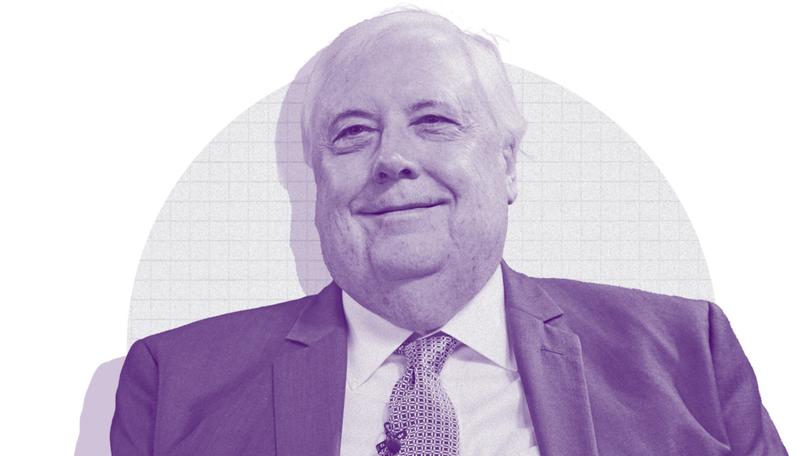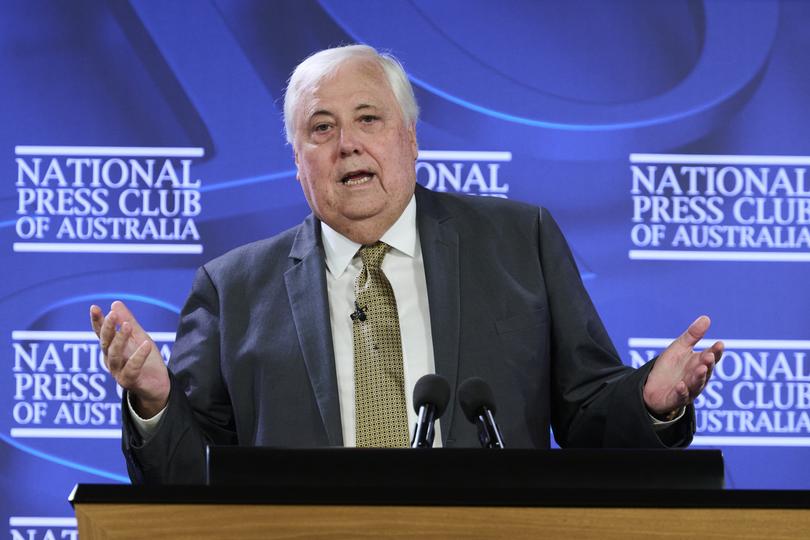MARK RILEY: Voters screwed twice by Clive Palmer-busting donation reform
MARK RILEY: If the crossbench’s primary consideration is to honour the will of the people, then it would be easy to argue that their will was to remove Labor from power.

Special Minister of State Don Farrell got a very special welcome in the halls of Parliament on Thursday.
That is, in the way that having someone stick knitting needles into your eyeballs might be considered “special”.
He was photobombed by teal independent Zali Steggall as he addressed the media on the deal he’d struck with the Coalition on campaign finance reform.
Sign up to The Nightly's newsletters.
Get the first look at the digital newspaper, curated daily stories and breaking headlines delivered to your inbox.
By continuing you agree to our Terms and Privacy Policy.Steggall accused him point blank of conspiring with the conservatives on a sweetheart deal that ensured they could “plunder taxpayers’ money” to bankroll “the lies that they want to tell you”.
She and her fellow independents see this as a stitch-up.
The reforms will severely limit the amount any single person or entity can donate to parties and candidates.
The main target is Clive Palmer.
He spent $123 million in the 2022 election. It got him just one Senate seat, but also won the combined determination of the major parties to put a legal clamp on his wallet.
But the changes also obliterate the funding model Simon Holmes a Court used to contribute $4.4m to the teals through Climate 200.
“Big parties win, voters lose!” screamed a news release from Curtin independent Kate Chaney when the deal leaked late Wednesday.
“Major parties stitch up!” blasted Goldstein independent Zoe Daniel’s release.
The longest standing independent, Andrew Wilkie, likened the move to the end of the age of dinosaurs.
“The last couple of dinosaurs, they’re lying in the mud, they’re flailing around, they’re attacking everyone around them — but they die,” he said.
The crossbench has never been so cross.
They claim the voter is getting screwed.
But they are only half right.
They are getting screwed twice.
Once as voters and again as taxpayers.
The deal will cap the amount any individual candidate can spend in a campaign at $800,000. Some of the teals spent well more than a million.
But it will allow the major parties to spend an additional $90m across the nation on “non-candidate-specific” campaigning.
The amount MPs can take from one donor will increase from $20,000 to $50,000 and the total amount one source can contribute a year will be capped at $1.6m.
And here’s where the taxpayer gets it in the neck. Or the pocket.
It also increases the amount taxpayers reimburse candidates from $3.38 for every vote to about $5 a vote.
That hikes the total amount taxpayers will hand the parties from about $76m to about $112m.
The lion’s share of that extra $36m will go to the Labor and Liberal parties.
That’s in addition to an extra $30,000 — up from $10,000 — for every candidate who polls more than 4 per cent of the vote.
That for the Labor and Liberal parties is every candidate.
Sweet deal. For them.

The new arrangements won’t be in place for the coming election but will still figure in a big way as a campaign issue.
And that is the real danger here. For both the major parties.
It is very possible that the coming election will produce a hung parliament.
Anthony Albanese and Peter Dutton would then have to go cap in hand to the teals and the Greens seeking their confidence and a guarantee to pass supply bills in order to form minority government.
The assumption is that most would back Labor.
Dutton would need minor earthquakes in NSW and Victoria to win the 18 seats he needs for majority.
But what if it is close? What if Dutton wins eight seats from Labor and independents and the Greens pick up four?
That would give the Coalition 66, Labor 65 and the crossbench 19.
If the crossbench’s primary consideration is to honour the will of the people, then it would be easy to argue that their will was to remove Labor from power.
With 19 seats the crossbench would also feel emboldened to demand ministerial positions, just like the Greens in the ACT government.
Or what if the Coalition won 12 seats and got to 70?
And at 72 seats, it would be able to form minority government with the backing of independents Dai Le, Rebekah Sharkie and Bob Katter as well as the support of independent Andrew Gee in Calare or the Nationals if they win back the seat.
That is why making the crossbench even more cross is a far from “special” thing to do.
Mark Riley is the Seven Network’s political editor

